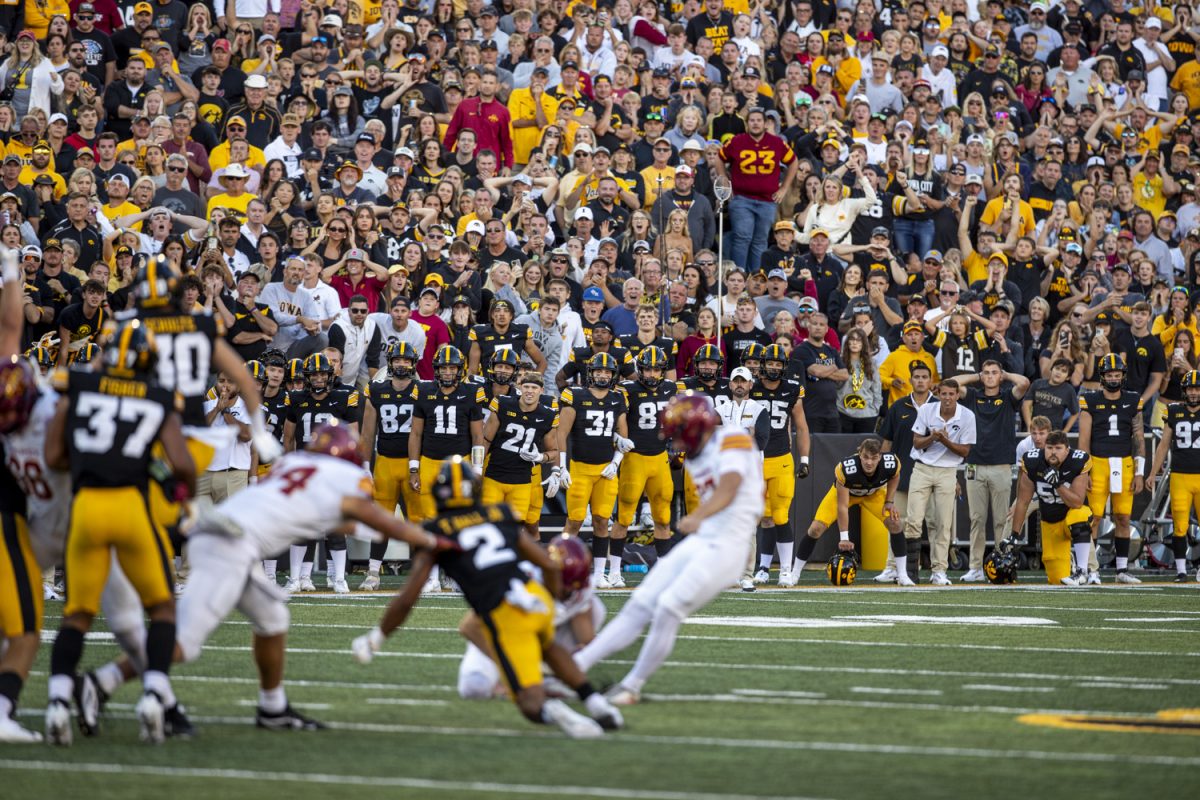What does Iowa football’s 20-19 loss to Iowa State Saturday have in common with Game 1 of the 1988 World Series between the Los Angeles Dodgers and the Oakland Athletics? The answer is simple, but frustrating all the same. Before the grand heroics, whether they be a walk-off home run or a go-ahead field goal, there are always the face-palming mistakes that precede them.
On the diamond that fateful night in Los Angeles, it was a five-pitch two-out walk to Mike Davis in the ninth inning. Davis, who hit just .196 that season in what would become his penultimate in the majors, only swung once at Oakland reliever Dennis Eckersley’s offerings. Eckersley led the majors in saves that season with 45 and placed second in the Cy Young voting, and his critical mistake of putting the tying run on base proved costly.
The next batter, a limping Kirk Gibson, made the Athletics pay, sending a rocket into the right field seats for a 5-4 Dodger victory.
On the gridiron beneath a setting sun in Iowa City, it was the Hawkeyes’ dreadful red zone offense, littered with incompletions and stuffed runs that ultimately kept the Cyclones within striking distance, allowing the young and ambitious redshirt freshman kicker Kyle Konrardy to nail his second-ever collegiate try. After Konrardy’s 54-yard attempt sailed through the uprights of the south end zone, Iowa didn’t have to look far to find the root of its demise.
“Having the ball down inside the five, we need to come away with touchdowns because it’s like walking a guy in the ninth inning in baseball; usually that comes back and gets you,” Iowa head coach Kirk Feretnz said postgame. “It’s amazing how that goes. Things like that early in the game especially can be consequential.”
When considering the ineptitude of the Iowa offense in the second half, “consequential” might be an understatement. Iowa’s three trips to the red zone, where they got at or inside the five-yard line three times, proved to be its best chance at hitting paydirt, and all it had to show was 12 points. When inside the opposition’s 20-yard line, quarterback Cade McNamara completed 2-of-5 passes for 15 yards. The ground game didn’t fare much better, as Kaleb Johnson, Hayden Large, Kamari Moulton, and Leshon Williams gained nine yards on seven carries.
McNamara had plenty of time to throw, he even admitted so in his postgame press conference. Yet despite the extra protection, an open receiver proved to be elusive. The quarterback explained how the Cyclones would drop eight players into the secondary, leaving nearly every Hawkeye blanketed.
“There’s eight guys across the entire end zone, and when we’re down that low, there’s not a lot of room,” he said. “It obviously worked for [Iowa State] … Overall, we have four tries, we can’t just come up empty there. We’ve got to find a way.”
Had the Hawkeyes crossed the end zone just one more time, it may have been Iowa State quarterback Rocco Becht and not McNamara launching a futile desperation heave into the twilight. But alas, such was not to be. Instead, as the Iowa State offense continued to find the chinks in Iowa’s defensive armor, the Hawkeyes reverted back to their old ways of offense – flat and predictable.
In Iowa’s final five drives of the game they either turned the ball over, went three-and-out, or produced less than 20 yards. Put those numbers into a vacuum I would’ve thought I was back in the press box in Madison watching as a Deacon Hill-led squad top Wisconsin in perhaps the ugliest game of college football I’ve seen in person.
Saturday’s fourth quarter took the cake. Iowa averaged 1.3 yards per play, earned three first downs, and totaled 25 yards. The playbook might of well have been Kaleb Johnson or bust, with Johnson taking a handoff more than 50 percent of the time. Ferentz indicated McNamara is still the starting quarterback heading into next week’s contest against Troy, but isn’t a starting quarterback someone you have to trust to throw the ball late in games?
Then again, a new man under center never materialized for Iowa last season, so I doubt any change will arrive barring injury. Safe to say, McNamara can only go up from here, as can the rest of the offense under new coordinator Tim Lester. The unit has felt the highs of quick, explosive scoring, but now they can add the disgust of paltry production to its sensory experiences. A Power Four team like Iowa State can do that to any offense, no matter how many points it piled on an FCS foe a week prior.
We’ve seen the highs and lows of Lester’s scheme, now it’s time to see the resolve. The Athletics never recovered from Gibson’s improbable homer and lost the series in five games. Oakland would take home the trophy in 1989, but with the number of sixth-year seniors on this Hawkeye squad, next year isn’t an option.



